Speaking at the 9th Global Conference of Young Parliamentarians, National Assembly delegate Bui Hoai Son, standing member of the National Assembly's Committee on Culture and Education, said that cultural diversity in Vietnam as well as in many countries is facing many non-traditional challenges.
This morning, September 16, the Global Conference of Young Parliamentarians continued its third thematic discussion session on "Promoting respect for cultural diversity for sustainable development", with the participation of more than 500 delegates, including more than 200 young parliamentarians from the Inter-Parliamentary Union (IPU).
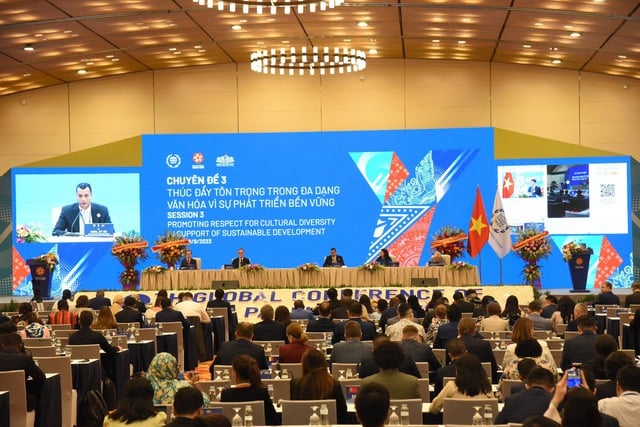
Overview of the discussion session on "Promoting cultural diversity for sustainable development goals". Photo: NGOC THANG
The role of cultural diversity is increasingly important
Speaking at the opening of the discussion, National Assembly delegate Bui Hoai Son said that in the context of increasingly deep international integration as today, the role of cultural diversity is increasingly important. Accepting, respecting and promoting cultural diversity helps strengthen dialogue between civilizations, promote understanding and increase mutual respect between nations and peoples.
Mr. Son said that Vietnam is a country with a rich history and traditional culture of thousands of years. Vietnamese culture has unity in diversity, is the blending and crystallization of the cultural identities of 54 ethnic groups. The community of 54 ethnic groups in Vietnam all share a national and ethnic consciousness, all join hands, unite, overcome all difficulties and challenges to build and protect the Fatherland.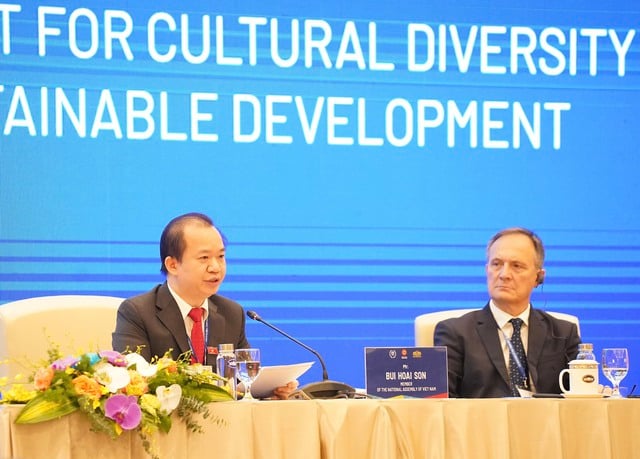
Mr. Bui Hoai Son chaired and spoke at the discussion session. Photo: NGOC THANG
The Vietnamese State has been implementing and constantly perfecting institutions and policies according to the consistent motto of "taking Vietnamese cultural values and people as the foundation and important endogenous strength, ensuring sustainable development".
The Platform for National Construction (supplemented and developed in 2011) has identified major and important orientations in the process of developing Vietnam, in which the most prominent contents are related to promoting cultural diversity, respecting the cultures of ethnic groups, and aiming for sustainable development goals.
Specifically, the platform states: " Building Vietnamese culture advanced, imbued with national identity, comprehensively developed, unified in diversity, deeply imbued with the spirit of humanity, democracy, and progress; making culture closely linked and deeply permeating the entire social life, becoming a solid spiritual foundation, an important endogenous strength of development.
Inheriting and promoting the fine cultural traditions of the Vietnamese ethnic community, absorbing the quintessence of human culture, building a democratic, fair, civilized society, for the true interests and dignity of people, with increasingly high levels of knowledge, morality, physical strength and aesthetics".
According to Mr. Son, the Vietnamese National Assembly is interested in and focuses on perfecting the legal system and promulgating policies to promote respect for cultural diversity for sustainable development. The Constitution - the original law with the highest legal value - affirms the equal rights of all ethnic groups, emphasizing that all ethnic groups are equal, united, respect and help each other to develop together; all acts of ethnic discrimination and division are strictly prohibited.
Non-traditional challenges
Mr. Son said that thanks to the attention of the Party, State and National Assembly, the cause of cultural development has achieved many important achievements, contributing to the prosperity of the country and being highly appreciated by the Vietnamese ethnic community and international friends and organizations.
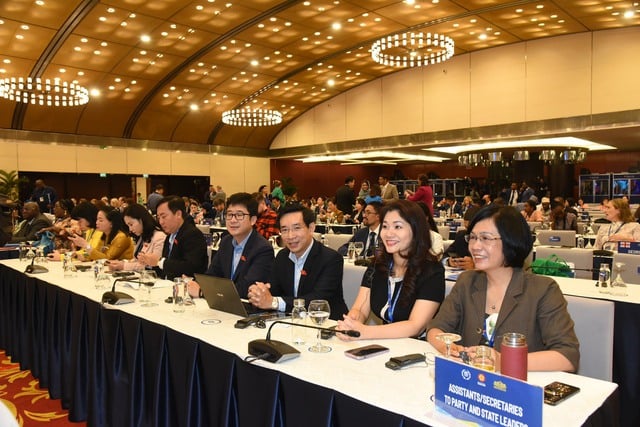
Delegates attending the discussion session. Photo: NGOC THANG
To date, Vietnam has 8 world cultural and natural heritages, 15 intangible cultural heritages recognized by UNESCO, 11 world biosphere reserves, 3 world documentary heritages, 6 documentary heritages in the Asia-Pacific region, 3 global geoparks, 1 creative city (in the UNESCO Creative Cities Network), making extremely important contributions to the socio-economic development of the country in general and the localities owning the heritages in particular.
At the same time, Mr. Son affirmed: "Deeply aware of its responsibility, Vietnam has proactively participated and demonstrated an active and responsible role in multilateral mechanisms, contributing to promoting and strongly promoting activities to protect and promote cultural diversity on a regional and international scale."
Vietnam is trusted by the international community and has been elected twice to the UNESCO Intergovernmental Committee for the Protection and Promotion of the Diversity of Cultural Expressions for the 2011-2015 and 2021-2025 terms. Based on the United Nations Sustainable Development Agenda, Vietnam has proactively developed a plan to develop a National Cultural Index to measure and evaluate the contribution of culture to the country's socio-economic development.
Mr. Son said that cultural diversity is considered a resource for the development of the world now and in the future. However, cultural diversity in Vietnam as well as in many countries is facing many challenges, especially non-traditional challenges of a digital age and globalization, which significantly affect the sustainability of cultural heritage and ethnic cultures.
"Therefore, at the 9th Global Conference of Young Parliamentarians, the 3rd plenary discussion with the theme "Promoting respect for cultural diversity for sustainable development" today is extremely meaningful," Mr. Son commented.
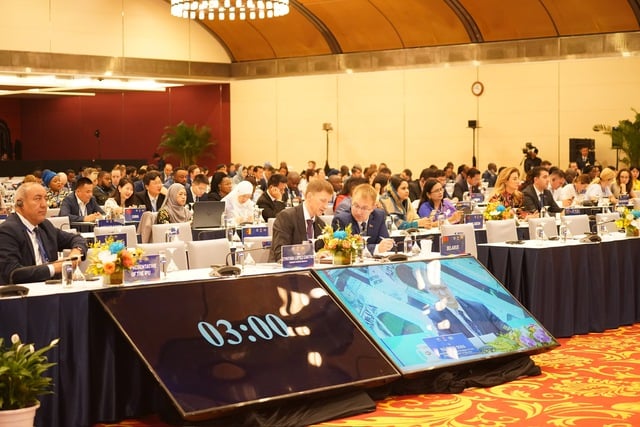
Delegates attending the discussion session. Photo: NGOC THANG
Ethical Digital Collaboration
Mr. Son suggested that delegates focus on discussing the role of parliaments and young parliamentarians in promoting respect for cultural diversity in the context of technological transformation, digital transformation and globalization.
Four contents were proposed, including: digital cooperation based on ethics and minimizing the unwanted impacts of digital transformation on privacy, security and happiness; promoting the role of culture in development policies at the national, regional and international levels; commitment to protecting and promoting cultural diversity, creating an environment and ecosystem favorable for culture and cultural diversity; the role of culture and cultural diversity in sustainable development.
The discussion results will be compiled by the organizing committee and included in the draft joint statement of the conference.
Representing the host country, Mr. Son suggested a number of proposals for delegates to discuss. Among them, it is necessary to affirm the role and value of culture as a driving force for sustainable development and the implementation of the United Nations 2030 Agenda. Promote the role of culture in development policies at the national, regional and international levels, making culture an independent goal of sustainable development.
"National parliaments are key players in affirming and promoting the role of culture in sustainable development, building and perfecting a people-centered policy framework, supporting the foundation for bilateral and multilateral foreign affairs, promoting respect for cultural diversity, peace and cohesion between communities and nations," Mr. Son proposed.
thanhnien.vn



![[Photo] Prime Minister Pham Minh Chinh works with the Standing Committee of Thai Binh Provincial Party Committee](https://vphoto.vietnam.vn/thumb/1200x675/vietnam/resource/IMAGE/2025/5/12/f514ab990c544e05a446f77bba59c7d1)
![[Photo] Prime Minister Pham Minh Chinh receives Swedish Minister of International Development Cooperation and Foreign Trade](https://vphoto.vietnam.vn/thumb/1200x675/vietnam/resource/IMAGE/2025/5/12/ae50d0bb57584fd1bbe1cd77d9ad6d97)


![[Photo] Prime Minister Pham Minh Chinh starts construction of vital highway through Thai Binh and Nam Dinh](https://vphoto.vietnam.vn/thumb/1200x675/vietnam/resource/IMAGE/2025/5/12/52d98584ccea4c8dbf7c7f7484433af5)




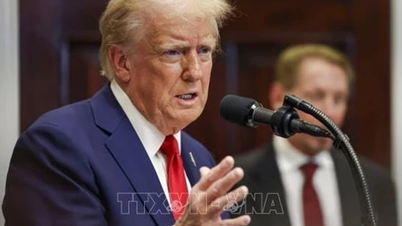







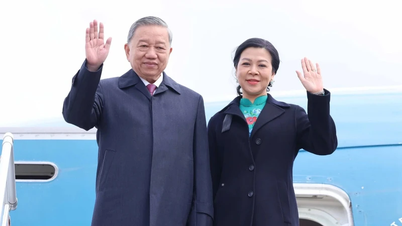
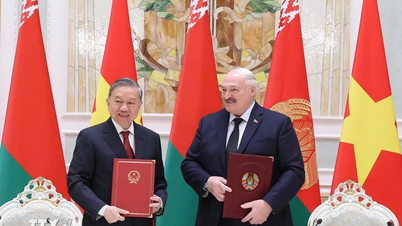









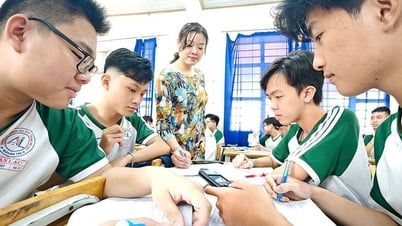
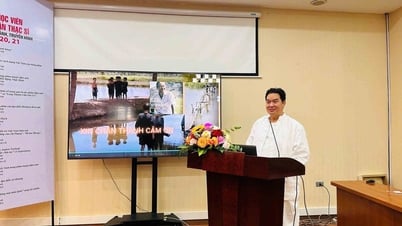
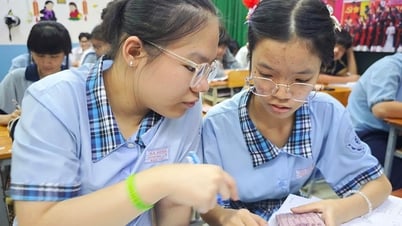
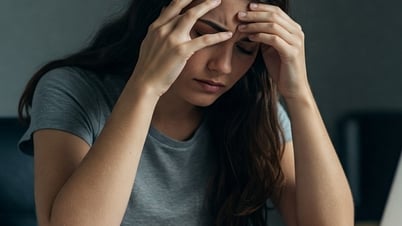
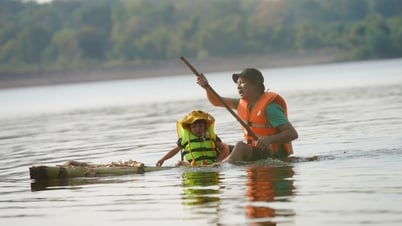








































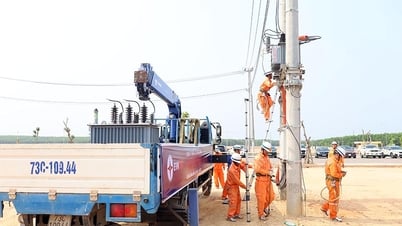


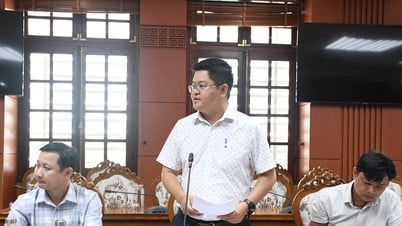
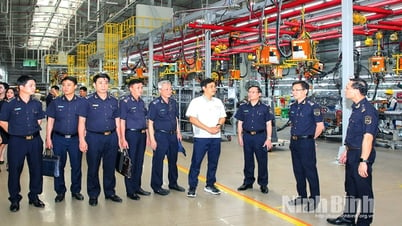



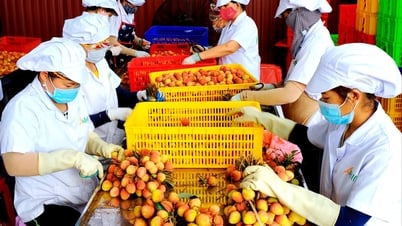











Comment (0)